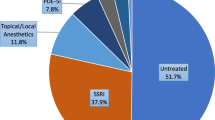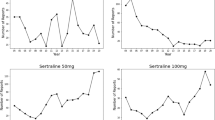Abstract
For many men, the treatment of sexual dysfunctions such as premature ejaculation may well be most effective when pharmacotherapy is combined with psychotherapy. Yet the essential elements of psychotherapy that might best be combined with pharmacological-based therapy are currently unknown. Support for evidence-based studies that identify key components of psychotherapy that might improve positive long-term outcomes, including patient satisfaction, are needed. Pharmaceutical companies having a vested interest in achieving both treatment adherence and improved patient outcomes could benefit from such information.
This is a preview of subscription content, access via your institution
Access options
Subscribe to this journal
Receive 8 print issues and online access
$259.00 per year
only $32.38 per issue
Buy this article
- Purchase on Springer Link
- Instant access to full article PDF
Prices may be subject to local taxes which are calculated during checkout
Similar content being viewed by others
References
Masters WH, Johnson VE . Human Sexual Inadequacy. Little, Brown & Co: Boston, 1970.
Kaplan HS . The New Sex Therapy. Brunner/Mazel: New York, 1974.
Heiman JR, Meston C . Empirically validated treatment for sexual dysfunction. Annu Rev Sex Res 1997; 8: 148–194.
Rowland DL, Cooper SE, Slob AK . The treatment of premature ejaculation: psychological and biological strategies. Drugs Today 1998; 34: 879–899.
DeAmicis LA, Goldberg DC, LoPiccolo J, Friedman J, Davies L . Clinical follow-up of couples treated for sexual dysfunction. Arch Sex Behav 1985; 14: 467–489.
Heiman JR, LoPiccolo J . Clinical outcome of sex therapy. Arch Gen Psychiatry 1983; 40: 443–449.
Hawton K, Catalan J, Martin P, Fagg J . Long-term outcome of sex therapy. Behav Res Ther 1986; 24: 665–675.
Hawton K . Sex therapy research: Has it withered on the vine? Annu Rev Sex Res 1992; 3: 49–72.
Schover LR, Leiblum SR . Commentary: the stagnation of sex therapy. J Psychol Hum Sex 1994; 6: 5–30.
Perelman MA . A new combination treatment for premature ejaculation: a sex therapist's perspective. J Sex Med 2006. doi: 10.1111/j.1743-6109.2006.00238.x.
American Psychological Association. American Psychological Association statement policy on evidence-based practice in psychology. Retrieved 1 September, 2005 from http://www.apa.org/practice/ebpreport.pdf.
McMahon CG, Abdo C, Incrocci L, Perelman M, Rowland D, Waldinger M et al. Disorders of orgasm and ejaculation in men. J Sex Med 2004; 1: 58–65.
Waldinger M . The neurobiological approach to premature ejaculation. J Urol 2002; 168: 2359–2367.
Althof SE . Therapeutic weaving: the integration of treatment techniques. In: Levine SB, Risen CB, Althof SE, (eds). Handbook of Clinical Sexuality for Mental Health Professionals. Brunner-Routledge: New York, 2003, pp 359–376.
Barada JH . Optimizing outcomes of oral therapy for patients with erectile dysfunction. Rev Urol 2003; 5: S28–S34.
Althof SE . Sexual therapy in the age of pharmacotherapy. Annu Rev Sex Res 2006; 17: 116–131.
Rowland DL, Cooper SE . Behavioral and psychological models in ejaculatory function research. Curr Sex Health Rep 2005; 2: 29–34.
Althof SE . Psychological treatment strategies for rapid ejaculation: rationale, practical aspects, and outcome. World J Urol 2005; 23: 89–92.
American Psychological Association. Empirically supported therapy relationships: conclusions and recommendations of the division 29 task force. Psychotherapy: Theory Res Pract Train 2001; 38: 495–497.
Straub RL . Health Psychology 2nd edn. Worth Publishers: New York, 2007, pp 375–383.
Rowland DL, Tai WL, Slob AK . Predicting responsiveness to the treatment of rapid ejaculation with 25 mg clomipramine as needed. Int J Impot Res 2004; 16: 354–357.
Norcross JC (ed). Psychotherapy Relationships That Work: Therapist Contributions and Their Responsiveness to Patient Needs. Oxford University Press: New York, 2002, pp 3–16.
Kazdin AE . Treatment outcomes, common factors, and continued neglect of mechanisms of change. Clin Psychol Sci Prac 2005; 12: 184–188.
Nathan PE, Gorman JM . A Guide to Treatments that Work 2nd edn. Oxford University Press: New York, 2002, pp 497–525.
Wampold BE, Bhati KS . Attending to the omissions: a historical examination of evidence-based practice movements. Prof Psychol Res Prac 2004; 35: 563–570.
Bohart AC, Tallman K . How Clients make Therapy Work: The Process of Active Self-Healing. American Psychological Association: Washington, DC, 1999.
Pfizer. Pfizer: Who we are: Public policy. Retrieved 2 January, 2006 from http://www.pfizer.com/pfizer/are/about_public/mn_about_clemente_article_medicare.jsp.
Miller KL . The Pill Machine. Newsweek (Atlantic Edn); 2001; 138: 44.
West D . Doing well by doing good. Pharmaceut Exec 2000; 20: 98.
Poor market. rich rewards. Economist 2004; 372: 65–66.
GlaxoSmithKline. GlaxoSmithKline: About GSK: The Company: The Spirit of GSK. Retrieved 2 January, 2006 from http://gsk.co.nz/about.asp?pageID=466.
Author information
Authors and Affiliations
Corresponding author
Rights and permissions
About this article
Cite this article
Rowland, D., Cooper, S. & Macias, L. Pharmaceutical companies could serve their own interests by supporting research on the efficacy of psychotherapy on premature ejaculation. Int J Impot Res 20, 115–120 (2008). https://doi.org/10.1038/sj.ijir.3901559
Received:
Revised:
Accepted:
Published:
Issue Date:
DOI: https://doi.org/10.1038/sj.ijir.3901559
This article is cited by
-
An Integrative Approach to the Treatment of Premature Ejaculation
Current Sexual Health Reports (2014)
-
‘Up and coming’ treatments for premature ejaculation: progress towards an approved therapy
International Journal of Impotence Research (2009)



